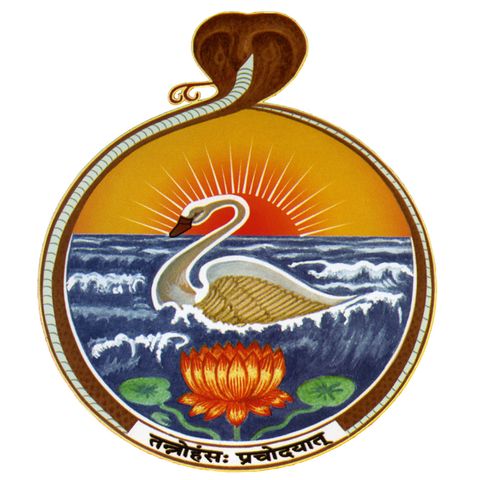28 - Performing Actions as Yajna | Swami Tattwamayananda

Download and listen anywhere
Download your favorite episodes and enjoy them, wherever you are! Sign up or log in now to access offline listening.
Description
3rd chapter: verses 16, 17, 18, 19, 20, 25 -The lecture was given by Swami Tattwamayananda on January 31, 2020. -Chakra is discussed in various traditions such as Buddhism and...
show more-The lecture was given by Swami Tattwamayananda on January 31, 2020.
-Chakra is discussed in various traditions such as Buddhism and Hinduism. It refers to the cycle of being born, doing actions, dying and being born again. Life is not one chance – rather, based on impressions and unfulfilled desires of past life, one is born again.
-Within the same family, different children have different characteristics. Only a tiny fraction of the characteristics can be traced to genealogy. Their unique characteristics come from past life. Despite each one having unique characteristics, there is a consistent Ritam of harmony that one should follow, both with other human beings and with nature.
-16th verse: He who follows this cosmic wheel of Ritam, principle of inter-relatedness and lives in harmony with nature – he lives in contentment. Others, who disturb cosmic life live in sin. Sin means something that we do to harm others and which, ultimately, harms us.
-17th verse: Such a person, who follows harmony with nature and living beings, is aware of his identity with nature, and sees the Atman manifesting as this harmony. He sees that the same Atman is inherent and immanent in all of us. As such, he cannot do anything that disturbs this harmony.
-Bhagavad Gita has ~700 verses and achieved prominence because of the commentaries written by Shankaracharya. It transcends religion and speaks about the quest for higher spiritual values that go beyond the physical.
-Ramanuja’s illustration of cause-effect Chakra is discussed. Food comes from clouds/rain, rain from water absorbed by sunlight, rivers empty their water into oceans, ocean water is absorbed by clouds, clouds come down as rain, rains give us food grains, food grains make human life possible and then there is prosperity/happiness.
-Shankaracharya says that the entire universe is a cycle of cause-effect link. This link may not be obvious like physics, but is intensely felt. When we do something wrong, we feel inner conflict. When we do dis-interested actions as Yajna, we feel contentment.
-Yajna has two meanings: (1) Vedic rituals for harmony and peace of the world, material prosperity, well-being of relatives, etc. Vedas discuss 14 types of such Yajnas. (2) Any noble activity done with a sense of sanctity and sacredness, for the good of others. Gita discusses Yajna in its broader sense of noble activity, which becomes a royal highway for spiritual prosperity.
-18th verse: Such a person, who performs all actions as Yajna, he doesn’t have anything to gain or lose. He feels permanent contentment, yet he doesn’t sit quiet but is fully active.
-Vedantic interpretation of richness is discussed. If a person has a lot of money but is not satisfied, he is poor. On the other hand, if a person has no money but is contented, he is rich.
-19th verse: Therefore, perform your actions, which are your obligations, without any attachment. By performing actions as such, one can reach the highest.
-To lead a spiritual life, one need not get rid of what he has and there is no need to achieve what he doesn’t already have. Whatever we do, we can start doing with a new perspective.
-When we do our duties with attachment, it creates mental anguish, which does not improve the performance of that duty. The same duty done without attachment leads to higher efficiency. Gandhiji’s example is discussed.
-20th verse: This verse refers to men with great spiritual merit. By Karma-Yoga alone, King Janaka attained perfection. Therefore, perform your actions without selfish motive.
-Philosopher King: Only the highest philosopher can be the most effective administrator, as he is aware of the limitations of his power, money and authority. Only a person who can think beyond money/power, should be allowed to handle money/power. Janaka was a philosopher king.
-Kalidasa’s Kumarasambhava: “Youth, money, power – each individually can lead to one’s downfall, if one has no spiritual common sense. What to speak of all them combined together”.
-Story of Janaka: Once Janaka was sitting in his court, when he got news of fire around the city. He stayed calm and made arrangements to put out the fire. When asked how he could stay calm, he replied: “Nothing is mine that will be destroyed. I am the Atman”. He then proceeded to give a discourse on Atman.
-25th verse: 25th verse should be studied in combination with 20th verse. There are two types of people. (1) Those who work hard with motive and are ignorant of the higher philosophy of Karma-Yoga. For them, every small problem becomes a big headache (2) Those who work equally hard, but who are grounded in Karma-Yoga. They are not worried and are called Vidwan.
-We cannot change our duties and obligations. We can change the way we interpret our actions. Karma-Yogis are able to work with greater efficiency because they have a different perspective on their actions.
-Soul has a natural way of connecting with next life. The general background for this is prepared in past life. If we die with a strong desire left, we will be born in circumstances where that desire can be fulfilled. Metaphor of an insect is provided, who fixes its front leg on next step before moving forward. Lord Krishna says that our spiritual practices from this life is deposited in our spiritual bank balance for our next life.
Information
| Author | Vedanta Society, San Francisco |
| Organization | Vedanta Society, San Francisco |
| Website | - |
| Tags |
Copyright 2024 - Spreaker Inc. an iHeartMedia Company

Comments